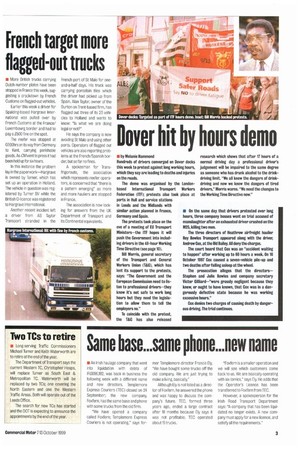Dover hit by hours demo
Page 5

If you've noticed an error in this article please click here to report it so we can fix it.
• by Melanie Hammond Hundreds of drivers converged on Dover docks this week to protest against long working hours, which they say are leading to deaths and injuries on the roads.
The demo was organised by the Londonbased International Transport Workers Federation (ITF): protests also took place at ports in Hull and service stations in Leeds and the Midlands with similar action planned in France, Germany and Spain.
The protests took place on the eve of a meeting of EU Transport Ministers—the ITF hopes it will push the Government into including drivers in the 48-hour Working Time Directive (see page 10).
Bill Morris, general secretary of the Transport and General Workers Union (T&G), which has lent its support to the protests, says: "The Government and the European Commission need to listen to professional drivers—they know it's not safe to work long hours but they need the legislation to allow them to tell the employers no."
To coincide with the protest, the T&G has also released research which shows that after 17 hours of a normal driving day a professional driver's judgement will be impaired to the same degree as someone who has drunk alcohol to the drinkdriving limit. "We all know the dangers of drinkdriving and now we know the dangers of tired drivers," Morris warns. "We need the changes to the Working Time Directive now."
II On the same day that drivers protested over long hours, three company bosses went on trial accused of manslaughter after an exhausted driver crashed on the M25, killing two men.
The three directors of Heathrow ajrfreight haulier Roy Bowles Transport appeared along with the driver, Andrew Cox, at the Old Bailey. All deny the charges.
The court heard that Cox was an "accident waiting to happen" after working up to 60 hours a week. On 16 October 1997 Cox caused a seven-vehicle pile-up and two deaths after falling asleep at the wheel.
The prosecution alleges that the directors— Stephen and Julie Bowles and company secretary Victor Gilliard—"were grossly negligent because they knew, or ought to have known, that Cox was in a dangerously defective state because he was working excessive hours."
Cox denies two charges of causing death by dangerous driving. The trial continues.




















































































































